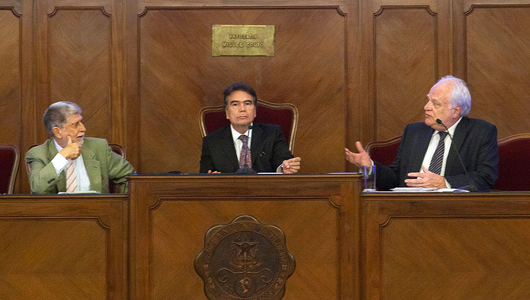Symposium discusses global health and health diplomacy

21/11/2017
André Costa (CCS)
The Brazilian National Academy of Medicine (ANM) and the Fiocruz Global Health Center (Cris/Fiocruz) promoted the Symposium on Global Health and Health Diplomacy and Brazilian Foreign Policy, on October 17, in Rio de Janeiro. The meeting brought together researchers and professors from the areas of health and international relations, in addition to having a conference of ambassador and former Minister of Foreign Affairs Celso Amorim.
Presentations and debates covered a range of topics from international issues on intellectual property and patents to the own concept of global health, including the challenges of professional and academic education in this area, refugee and migrant health, and the convergence of interests among philanthropic foundations and financial market forces in guiding the international health agenda in accordance with neoliberal principles. One of the main ideas presented was that global health and health diplomacy are new fields, interdisciplinary in nature, and therefore in great dispute.
At the opening of the event, former president of Fiocruz's, Cris coordinator and ANM member Paulo Buss referred to the current situation of cooperation in health in Latin America, which, in his words, undergoes a "delicate time of national and external politics". "Lethargy has taken hold of integration processes in Latin America and the Caribbean, and this is reflected on the existing little dynamic process of integration in health. It is a time of health crisis, facilitated by the environmental, economic and social situation," Buss said.
The researcher also stressed that the region, in addition to having old challenges such as inequality, also faces new problems such as an intensification of the flow of migrants, who in most cases live in precarious situations.
In his lecture, ambassador and former chancellor Celso Amorim talked about the field health in his experience as head of the Ministry of Foreign Affairs and the current situation of Brazil in the global context. Amorim stressed that the global health area, in addition to its medical and health bias, always has a "political component, because relations are never innocent".
The ambassador said that “in a sense, health has always been present in diplomacy, because the main purpose of diplomacy is peace," adding that often trade agendas beyond their economic dimensions are also intended to promote cooperation and closeness among nations.
“Mercosur has never had a purely economic aspiration. It was born with the primary goal of peace and democracy. From the beginning, we had a clear view that trade was an instrument for this," he said.


